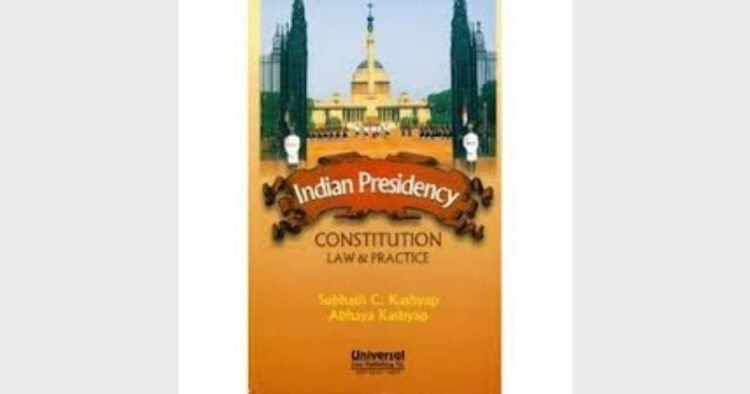Nidhi Mathur
Indian Presidency: Constitution Law & Practice, Subhash C Kashyap and Abhaya Kashyap, Universal Law Publishing, Pp 276, Rs 525.00
WRITTEN by a Constitution expert in collaboration with Abhaya Kashyap, the book makes a sustained effort to counter, both in the academia and in politics, the tendency to underrate, undermine and even denigrate the importance and relevance of the institution of the President of the Republic.
The study presents a perspective on the role of the President in discharging his or her obligations to “preserve, protect and defend the Constitution and the law” and to devote himself or herself “to the service and well-being of the people of India.”
Our Constitution does not envisage a puppet, a titular or a nominal head of the republic; instead the President may face challenges that call for crucial decisions in his or her individual discretion without the aid and advice of the council of ministers headed by the Prime Minister, for instance, in the appointment of a new Prime Minister in case of a hung house or after passing of a no-confidence motion in the council of ministers.
There are two important aspects to the election to the President’s office – one, the Constitution provides for the election of the President by the electoral college consisting of elected representatives of the people, but in India, the people are nowhere on the scene. The members of the electoral college are the people’s representatives who have to receive the nod from their party High Command. What bargains are struck behind the curtain with the supporters and selected candidates can never be in pubic domain. Voting is done through the secret ballot and the electors can vote freely without fear or favour. Second, the candidate elected must not be a captive of any party, but a man or woman of national stature, from any field, including politics. He or she can be of any religion, caste or creed, above controversies, of impeccable integrity and with the ability to take independent and non-partisan decisions in public interest.
The President has crucial powers and constitutional responsibilities to exercise and this is not subject to Article 74 which requires him or her to act on the advice of the council of ministers. He or she can withhold assent to a Bill passed by the Rajya Sabha and Lok Sabha. The President can also remit a Bill (if not a Money Bill) back to the two Houses for reconsideration. These powers need not be exercised on the advice of the council of ministers.
The authors thus explain the process of election of the President, how 13 presidential elections were held right from Dr Rajendra Prasad to Smt Pratibha Patil (Pranab Mukherjee is not included yet), how Dr Sanjiva Reddy was elected uncontested, how VV Giri’s election was hotly contested, how Dr Rajendra Prasad was elected for two terms, and how R Venkataraman as elected against Justice Krishna Iyer and Mithilesh Kumar.
The book also includes letters exchanged between Dr Rajendra Prasad and Prime Minister Nehru, the reflections on the presidential election of 2012, etc. Annexure XVI contains three landmark judgements related to Presidential elections.
(Universal Law Publishing Co. Pvt Ltd, C-FF-A, Dilkhush Industrial Esate, GT Karnal Road, Delhi-110 033; www.unilawbooks.com)














Comments